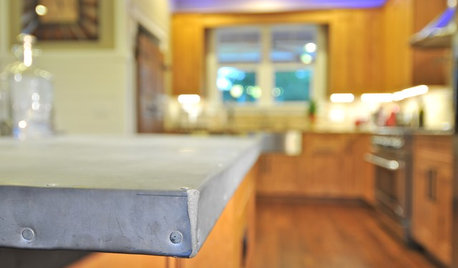Copper and zinc deficiencies
macky77
10 years ago
Related Stories

DESIGN DICTIONARYZinc
Zinc, key to galvanizing metal, is a versatile choice for roofing, countertops and more
Full Story0

KITCHEN DESIGNThink Zinc for Kitchen Countertops
Adaptability is the hallmark of zinc for kitchen countertops, combining the durability of metal with the natural look of stone
Full Story
CURB APPEALModern Materials: Copper, Architecture's Natural Beauty
The rich patina is just the beginning — copper for home exteriors is strong, shapable and highly recyclable
Full Story
KITCHEN DESIGNSurprise Contender: Copper for Kitchen Countertops
Unexpected and full of character, copper is getting buffed for its growing appearance on the countertop scene
Full Story
MODERN ARCHITECTUREDesign Workshop: Modern Metal Shingle Style
Steel, copper and zinc shingles take siding to new heights, with less maintenance than their wooden cousins
Full Story
KITCHEN APPLIANCESThe Many Ways to Get Creative With Kitchen Hoods
Distinctive hood designs — in reclaimed barn wood, zinc, copper and more — are transforming the look of kitchens
Full Story
SHOP HOUZZShop Houzz: Top Brass
Try this beautiful golden zinc-copper alloy to add zing to any room
Full Story
KITCHEN DESIGNAlternatives to Granite Countertops, Part II
Still looking for a new kind of countertop? Try sodalite, zinc, limestone, onyx and more
Full Story
REMODELING GUIDESMetal Works Wonders With Home Exteriors
Whether they use steel panels, a copper skin or corrugated cladding, these metal home exteriors gleam with ingenuity
Full Story
DECORATING GUIDESA Periodic Table of Design Elements
Add Panache With Copper, Tin, Aluminum and More
Full Story






Slimy_Okra
ericwi
Related Professionals
Kapaa Landscape Architects & Landscape Designers · Panama City Landscape Architects & Landscape Designers · White Oak Landscape Architects & Landscape Designers · Ellensburg Landscape Contractors · Gloucester Landscape Contractors · Los Banos Landscape Contractors · Mequon Landscape Contractors · North Chicago Landscape Contractors · Post Falls Landscape Contractors · Arbutus Decks, Patios & Outdoor Enclosures · Ashland Decks, Patios & Outdoor Enclosures · Meridian Decks, Patios & Outdoor Enclosures · Roanoke Decks, Patios & Outdoor Enclosures · Truckee Decks, Patios & Outdoor Enclosures · Pleasant Grove Decks, Patios & Outdoor Enclosurespnbrown
macky77Original Author
ericwi
pnbrown
glib
macky77Original Author
glib
Slimy_Okra